Newspaper articles for March 2020 from OS "Sveti Petar", Orehovec
Among 6 countries in the Etwinning project.docx
Members of the Network of young advisers for Children's ombudsman - children's voice should be herd more.docx
Members of the Network of young advisers for Children's ombudsman - children's voice should be heard more
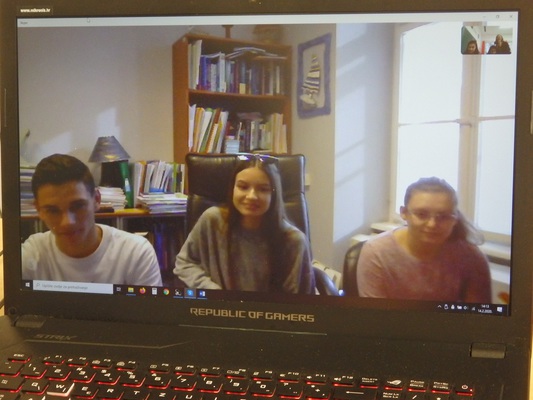
We had a Skype interview with three students from high schools in Zagreb who recently had a chance to speak about children's rights in the Croatian parliament
Stela Tonner (16), Patricia Čretni (16) and Niko Radujković (15) are high school students from Zagreb whom we have met via Skype on Friday, 13 of February. The girls go to 2nd-grade od II gimnazija and Niko who is the last year winner of Luka Ritz reward - "Violence is not bravery", is a 1st-grade student of Prirodoslovna gimnazija. The reason for our video call was their membership in MMS (Network of young advisers of children's ombudsman). They talked about the way they work and why would they recommend membership in MMS to other students.
Stela, Patricia and Niko told us when will be the next opportunity to become MMS member. They skyped with us from the Children's ombudsman office that is located in Teslina street 10 in Zagreb.
We have organized Skype call with members of MMS trough adviser Maja Flego who also participated in this Skype interview together with her colleague Ivona Salaj. They are both advisers od Children's ombudsman and they actively cooperate with young advisers and help them in their work.
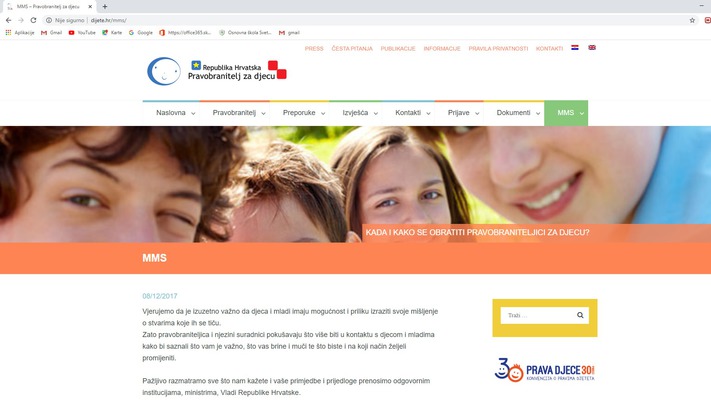
When did you become a member of MMS and how did you get the idea to join the work of MMS?
Patricia: We are all members since November 2017. I have heard about the contest in the media.
Stela: My middle school pedagogue recommended me to apply for it.
Niko: It was similar with me, but my class teacher forwarded me the e-mail and recommended to reach out. She thought that something like this could interest me.
What do you need to do to become MMS member?
Niko: Besides the application form you need to send a motivational letter. There you should write what do you do and why do you think that you should become MMS member. Members of the MMS can become children age 12 - 16 for a period of 3 years and then there are new elections. That means that this year in May everyone who wants to be MMS member will get a chance to apply for the office.
In what way do you work in MMS?
Patricia: We mostly work via e-forum for which every member has their password. On the forum, we suggest various topics connected to the children's rights or something else that interests us and we discuss about that. We meet in person two times a year.
Who suggests your activities?
Stela: Some of the activities are results of our discussions on the forum and sometimes the advisors who are in charge of working with the MMS suggest some activities.
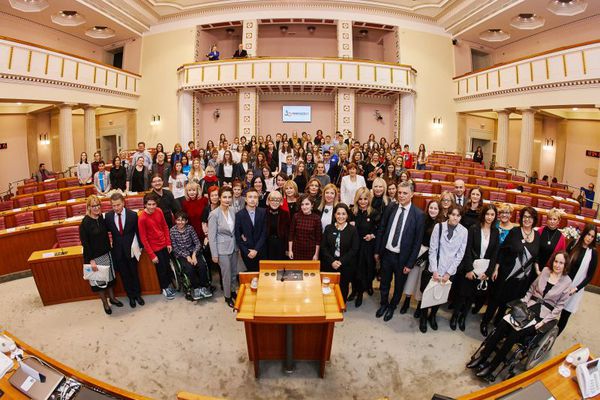
Has one of you personally suggested some activities?
Niko: I have suggested that the members of MMS and students from my middle school join the National campaign for people with reading disabilities and dyslexia ˝I also want to read˝.
Patricia: I have started the topic on the forum about adoption and children without parents, but as we all participate in discussions, it is not that important who started it.
About which topics have you advised the ombudsmen since becoming MMS members?
Stela: On our forum, we also have a Chat room and there we can talk about whatever we want. But I would say that we mostly dealt with peer violence and cyberbullying and that we have advised the ombudsmen the most about these topics and children's participation.
On which activities, conducted during your mandate, are you especially proud of?
Niko: Maybe on the presenting of our views about the need for children's participation that we held last year in November in the Croatian parliament. That was organized for the occasion of the 30th anniversary of the Convection of children's rights.
Stela: We sat in the chairs of Croatian parliament representatives and it felt good. We also had a chance to ask questions. I remember there was one question about teachers' strike that was current at that time and also one about the changes with final exams for our generation. I also remember that we weren't very pleased with the answers because they weren't concrete enough.
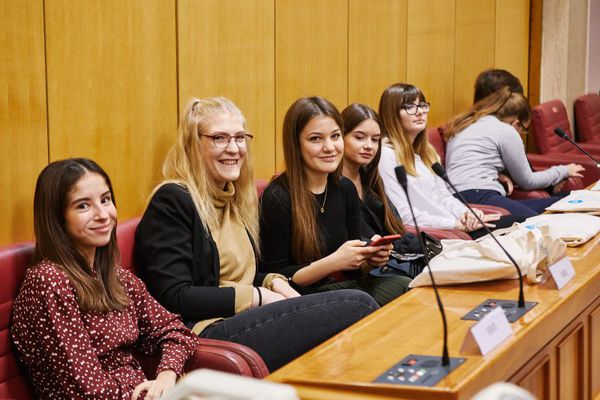
Grown-ups shouldn't just impose their opinion to us
Do other students in your schools know you are MMS members?
Niko: More students know it now when I'm in high school than they knew when I was in middle school. That is because the headmaster of our school insists on many activities in the prevention of peer violence.
Patricia: In our school, they know me and Stela are MMS members, but they don't know much details about how MMS works.
What is your opinion about Children's rights conditions in Croatia? Which children's rights are the least respected?
Stela: It seems to me that in fact, the biggest problem is children's participation in society. Children's voices should be heard more especially when it is about themselves. The grown-ups shouldn't just impose their opinion, but help to find our opportunities, who do we want to be and in what way we want to deal with certain things.
Do students in your school have a chance to participate in making decisions regarding their school life and school work?
Patricia: In middle school, we had a Student Council, but it was only working on paper. We didn’t really have any influence trough that council. In high school, the situation is better and we have a chance to propose some things that matter to us. As an example, we have a chance to propose projects on which we want to work and where we want to go on excursions. In our school student's participation lead to opening of the school cafeteria.
Niko: In my middle school Student Council was also just a form. In high school, we have a bigger power. Our Student Council was very active in advocating to have lectures in one shift. We are very happy that our school was up-sized this year and now we have one shift classes.
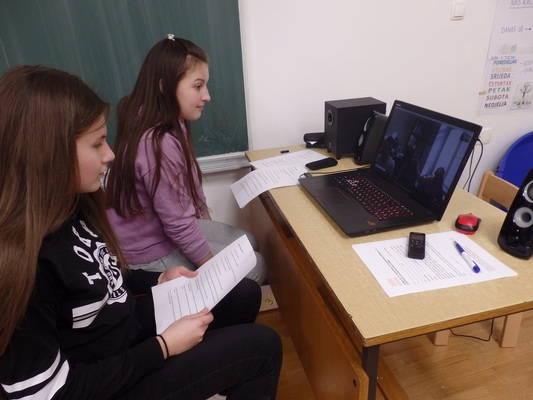
Why would you recommend to other young people to apply for the MMS membership in the next contest?
Patricia: To me participating in MMS is a beautiful experience. I have met young people from different parts of Croatia. I had a chance to exchange opinions and experiences and to grow as a person.
Stela: In MMS we have the support of adult advisors and they help us to form our ideas. To me, it is also an important and beautiful experience. Especially because I have a chance to be active, to do something and to see that politicians have received my message. /Lorena Benčak i Lea Harča, 7.b: foto: S. L. and interneta/
The original article is published in the school digital magazine Klinček
xxxxxx
Among 6 countries in the Etwinning project, our students use the Internet for studying the least
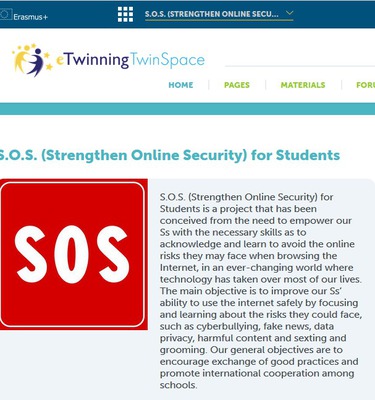
The survey was conducted as part of the eTwinning project that includes schools from Finland, Poland, Portugal, Romania, and Spain.
Students from our school use the Internet significantly less for studying than students from schools in Finland, Poland, Portugal, Romania, and Spain. That was the result of the survey conducted as part of the eTwinning project S.O.S. (Strengthen Online Security). Our school included 73 students from classes 5a, 6a, 7a and 8a.
The question of what do they use the most on the Internet, students were given 16 options and they had to choose 4 things they do the most. The answers are mostly similar and students from almost every partner school use the Internet for playing games, listening to music, watching movies and for communicating on social networks. Percentages are just slightly different, but as mentioned in the title they are very different when it comes to the use for school and learning. That percentage varies a lot and our school takes the last place with 25% of students who stated that they use the Internet also for learning. Students from Portugal take first place with 56,4%. Followed by students from Poland with 42,9% and students from Finland with 41%. The fourth place goes to Romanians with 40,7% and fifth are Spanish students with 38,3%.
| | Using the internet for learning and school |
| Finska | 41% |
| Hrvatska | 25 |
| Poljska | 42,9 |
| Portugal | 56,4 |
| Rumunska | 40,7 |
| Španjolska | 38,3 |
| | |
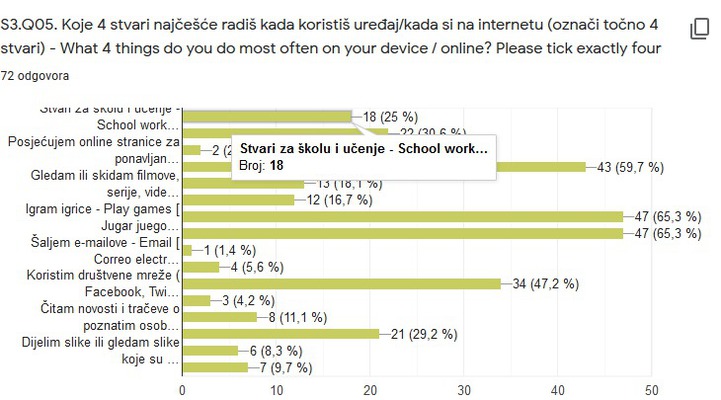
Instagram is the most popular social network
For the purpose of this article, we have analyzed the data about the 4 most popular social networks. Based on the students' answers Instagram is definitely a social network number one. Only in Poland Facebook is still more popular by 5%. In Croatia Facebook is holding strong and 62,9% of students use it, while in Portugal that number is just 2,8%. Snapchat is also very popular social network among students. it is used the least in Spain with just 29,7%. WhatsApp is used the least in Poland with 36,4% and Croatia follows with 40%. It is used much more in other countries but mostly in Finland where 95,8% of surveyed students use that messaging platform.
In the next article, we will analyze the data connected to Internet safety, /Lea Harča, 7b/
Using social networks
| | Facebook | Instagram | Snapchat | Whatsap |
| Finska | 21% | 92,7 | 94,5 | 95,8 |
| Hrvatska | 62,9 | 88,6 | 77,11 | 40 |
| Poljska | 83,3 | 78,2 | 66,7 | 34,6 |
| Portugal | 2,8 | 75 | 47,2 | 83,3 |
| Rumunska | 46,2 | 88,9 | 56,4 | 88,5 |
| Španjolska | 14,5 | 70,3 | 29,7 | 68,8 |
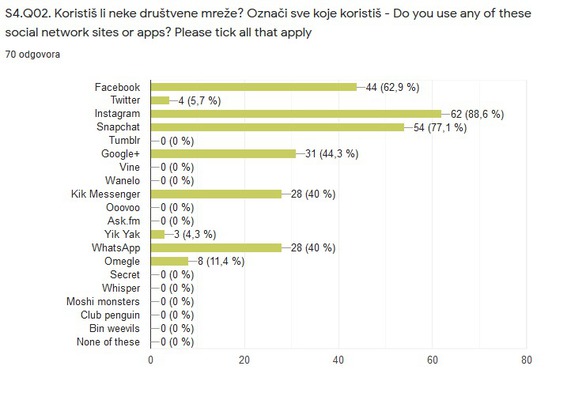
The original article is published in the school digital magazine Klinček